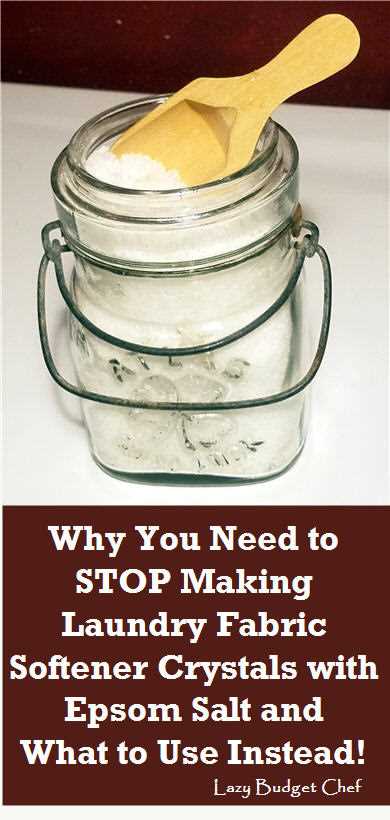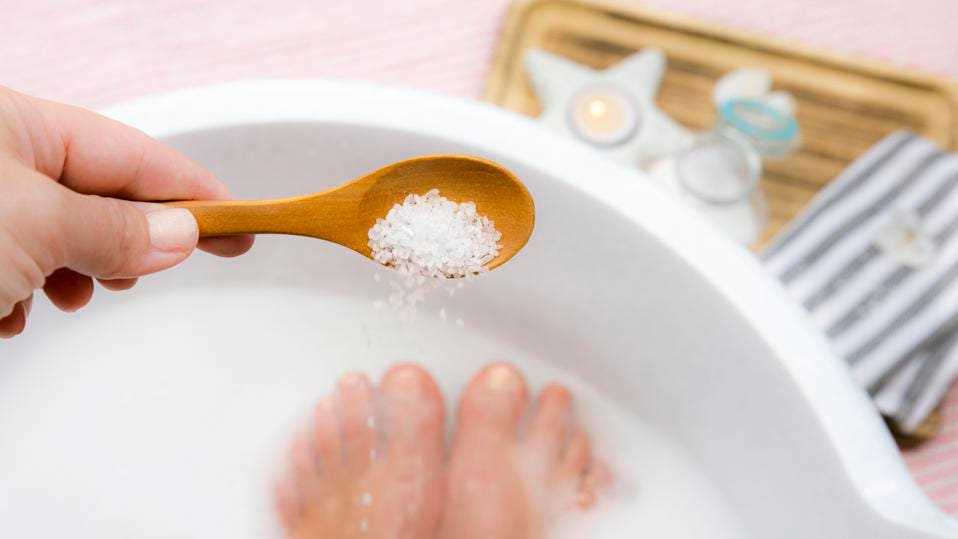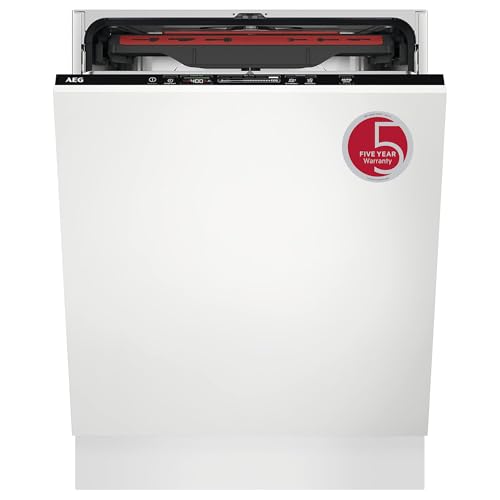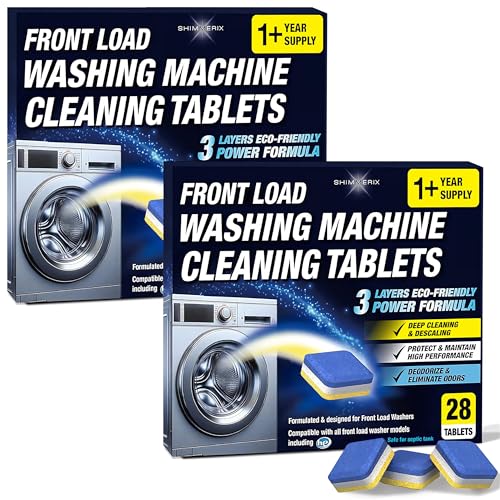


Washing machines are an essential appliance in every household, ensuring that our clothes are clean and fresh. However, when it comes to washing our clothes, there are many factors to consider, including the type of detergent and additives we use. One common additive that has gained popularity in recent years is Epsom salts. But are Epsom salts safe for washing machines?
Epsom salts, also known as magnesium sulfate, have long been used for their therapeutic properties. They are believed to help relax muscles and relieve pain and inflammation. Some people have started adding Epsom salts to their laundry to help soften their clothes, remove odors, and provide a natural boost to their laundry routine.
While Epsom salts may have some benefits for the skin and body, their use in washing machines is a topic of debate among experts. Some believe that the salts can help remove mineral deposits and soap residue from the machine, while others argue that they may cause damage over time.
It is important to note that washing machines are designed to work with specific types of detergents and additives. Adding Epsom salts to the wash water may disrupt the delicate balance of chemicals and affect the performance of the machine. Additionally, the salts may not dissolve completely and could build up in the machine, leading to clogs and potential damage.
Ultimately, whether or not to use Epsom salts in your washing machine is a personal decision. It is always best to follow the manufacturer’s recommendations and consult with a professional if you have any concerns. It is also important to consider the type of fabric and clothing you are washing, as some materials may react differently to the salts.
Expert advice: If you are considering adding Epsom salts to your laundry, it is recommended to start with small amounts and monitor the performance of your washing machine. If you notice any issues, such as residue buildup or decreased performance, it may be best to discontinue use. Always prioritize the longevity and performance of your washing machine to ensure the best results for your clothes.
Are Epsom Salts Safe for Washing Machines?

Epsom salts, also known as magnesium sulfate, are commonly used in various household applications, including as a natural remedy for soothing muscles and promoting relaxation. However, when it comes to using Epsom salts in your washing machine, there are a few important considerations to keep in mind.
Benefits of Using Epsom Salts in Washing Machines
- Softens hard water: Epsom salts can help soften hard water, which can lead to better cleaning performance and prevent mineral buildup in your washing machine.
- Brightens and removes stains: Adding Epsom salts to your laundry can help brighten colors and remove stains, thanks to its mild abrasive properties.
- Freshens and deodorizes: Epsom salts can help freshen and deodorize your laundry, leaving a pleasant scent behind.
Potential Risks and Precautions
While Epsom salts can provide certain benefits when used in washing machines, it is important to be aware of potential risks and take necessary precautions:
- Potential damage to the machine: Epsom salts, when used in excessive amounts or too frequently, can potentially cause damage to the internal components of your washing machine. It is recommended to use Epsom salts sparingly and follow the manufacturer’s guidelines.
- Residue and clogging: Epsom salts may leave behind a residue or cause clogging in your washing machine’s pipes or filters if not properly dissolved. To prevent this, dissolve the salts in warm water before adding them to your laundry.
How to Use Epsom Salts in Washing Machines
When using Epsom salts in your washing machine, follow these guidelines:
- Start with a small amount: Begin by adding a quarter to half a cup of Epsom salts to your laundry load. Monitor the results and gradually increase or decrease the amount as needed.
- Dissolve the salts: Dissolve the Epsom salts in warm water before adding them to your washing machine. This will help prevent residue and ensure proper dissolution.
- Use in moderation: Avoid using Epsom salts in every wash cycle. Use them sparingly, such as once a month or as needed, to avoid potential damage to your washing machine.
Conclusion
Epsom salts can be safe to use in washing machines when proper precautions are taken. However, it is important to use them in moderation, dissolve them in warm water, and monitor for any potential damage or clogging. Consult your washing machine’s manufacturer or a professional if you have any concerns about using Epsom salts in your specific machine.
The Importance of Proper Washing Machine Maintenance
Proper maintenance of your washing machine is essential to ensure its longevity and performance. By following a few simple steps, you can keep your washing machine running smoothly and prevent costly repairs or replacements.
Regular Cleaning
Regular cleaning of your washing machine is crucial to keep it free from dirt, debris, and odours. It is recommended to clean your machine at least once a month.
- Start by wiping down the exterior and control panel with a damp cloth.
- Remove any lint or debris from the lint trap and clean it thoroughly.
- Check the rubber door seal for any residue or mould and clean it with a mixture of vinegar and water.
- Run an empty cycle with hot water and a cup of vinegar to remove any build-up or odours.
- Finish by wiping the interior drum with a mixture of baking soda and water to eliminate any remaining odours.
Proper Loading
Proper loading of your washing machine is essential to prevent damage to the machine and ensure a thorough clean. Overloading the machine can strain the motor and reduce its lifespan.
Follow these guidelines for proper loading:
- Sort your laundry based on fabric type, color, and level of dirtiness.
- Avoid overloading the machine. Leave enough space for the water, detergent, and clothes to move freely.
- Distribute the clothes evenly in the drum to prevent unbalanced loads.
- Use the recommended amount of detergent and fabric softener. Excess detergent can lead to residue build-up and damage the machine.
Regular Inspections
Regular inspections of your washing machine can help identify any issues early on and prevent major problems.
Here are some key areas to inspect:
- Check the water hoses for any leaks, bulges, or cracks. Replace them if necessary.
- Inspect the drainage pump for any clogs or blockages.
- Check the drum for any signs of wear or damage.
- Test the machine’s different cycles and functions to ensure they are working properly.
Professional Servicing

While regular maintenance can go a long way in preventing issues, it is also important to schedule professional servicing for your washing machine. A professional can thoroughly clean and inspect your machine, as well as identify any potential problems before they worsen.
Regular maintenance and proper care of your washing machine can extend its lifespan and ensure its optimal performance. By following these simple steps, you can keep your machine running smoothly and enjoy clean laundry for years to come.
Understanding Epsom Salts and their Uses
- Epsom salts, also known as magnesium sulfate, are a popular household product with various uses.
- They are commonly used in bath salts and skin care products due to their potential health benefits.
- Epsom salts are also used in gardening to improve soil quality and promote plant growth.
- One of the lesser-known uses of Epsom salts is in cleaning, including washing machines.
Why use Epsom salts in washing machines?

Epsom salts can be effective in improving the performance and longevity of washing machines. Here’s why:
- Softening water: Hard water can cause mineral buildup in washing machines, leading to reduced efficiency and potential damages. Epsom salts can help soften the water, preventing mineral deposits and improving overall cleaning results.
- Brightening whites: Adding a cup of Epsom salts to the laundry can help brighten and whiten white clothing. The salts can help remove stains and yellowing, resulting in cleaner and fresher-looking garments.
- Freshening fabrics: Epsom salts can help eliminate odors from clothes, towels, and other fabrics. By adding Epsom salts to the washing machine, you can enjoy fresher-smelling laundry.
- Preventing yellowing: Epsom salts are known to prevent yellowing of fabrics over time. Regular use of Epsom salts in the washing machine can help maintain the original color and appearance of clothes.
How to use Epsom salts in washing machines?
Using Epsom salts in your washing machine is simple. Here’s a step-by-step guide:
- Preparation: Start by checking the manufacturer’s instructions for your washing machine. Some machines may have specific guidelines regarding the use of additives like Epsom salts.
- Amount: Add about a cup of Epsom salts to the washing machine along with your regular laundry detergent.
- Run the cycle: Start the washing machine as you normally would and let it complete the washing cycle. The Epsom salts will dissolve in the water, and their benefits will be incorporated into the cleaning process.
- Enjoy the results: Once the cycle is complete, you can expect cleaner, brighter, and fresher-smelling laundry.
Note: It’s important to remember that Epsom salts should not be used as a substitute for laundry detergent. They should be used in addition to your regular detergent for best results.
In conclusion
Epsom salts can be a useful addition to your laundry routine. They can improve the performance of washing machines by softening water, brightening whites, freshening fabrics, and preventing yellowing. By following the proper usage instructions, you can enjoy the benefits of Epsom salts in your laundry.
Potential Risks of using Epsom Salts in Washing Machines
While Epsom salts are commonly used for various purposes, including as a cleaning agent, it is important to consider the potential risks associated with using them in washing machines. Here are some potential risks to be aware of:
- Damage to the washing machine: Epsom salts are a form of salt, and when dissolved in water, they can potentially cause corrosion or damage to the internal components of the washing machine. This may include the metal parts, such as the drum or pipes, or even the electrical components.
- Residue build-up: Epsom salts may not dissolve completely during the wash cycle, especially if used in large quantities. This can result in a build-up of residue on the clothing or inside the washing machine, leading to potential issues such as staining, clogging, or unpleasant odors.
- Effectiveness of detergent: Adding Epsom salts to the washing machine may interfere with the effectiveness of detergent. This can lead to inadequate cleaning of the clothes, resulting in them not being fully fresh or free of stains.
- Voiding warranty: The use of Epsom salts in the washing machine may void the warranty provided by the manufacturer. It is important to review the washing machine’s user manual or consult the manufacturer before using any substances that are not recommended.
It is always recommended to follow the manufacturer’s instructions and guidelines for using washing machines. If you are looking for alternative cleaning agents, it is advisable to use products that are specifically designed for the purpose and are compatible with your washing machine.
Expert Advice on Using Epsom Salts in Washing Machines
- Epsom salts, also known as magnesium sulfate, can be used in washing machines for various purposes.
- However, it is important to know the proper usage and potential risks associated with using Epsom salts in washing machines.
Benefits of Using Epsom Salts
- Softening hard water: Epsom salts can help soften hard water, which is beneficial for washing clothes. Soft water allows detergents to work more effectively and prevents mineral buildup in the washing machine.
- Brightening whites: Adding Epsom salts to the wash cycle can help enhance the brightness of white clothing and remove yellowing or grayish hues.
- Stain removal: Epsom salts can assist in removing stains from fabrics by breaking down the stains and aiding in their removal.
Guidelines for Using Epsom Salts
- Quantity: Use about 1/2 to 1 cup of Epsom salts per load of laundry, depending on the size of the load and the desired effect.
- Addition: Add the Epsom salts to the water before adding the laundry and detergent. This helps dissolve the salts and distribute them evenly throughout the wash cycle.
- Compatibility: Epsom salts are generally safe to use with most types of fabrics and colors. However, it is recommended to check the care label on the clothing for any specific instructions or restrictions.
- Frequency: It is advisable to use Epsom salts in washing machines occasionally rather than for every load. This prevents any potential buildup of salts in the machine or on the clothes.
Potential Risks and Considerations
- Residue buildup: Overusing Epsom salts in washing machines can lead to residue buildup on clothes and in the machine itself. This can result in clothes feeling stiff or scratchy and may affect the performance of the machine.
- Color fading: Epsom salts may have a slight bleaching effect on certain colors, so it is recommended to test a small, inconspicuous area of the clothing before using Epsom salts for the entire load.
- Pre-existing conditions: If your washing machine has any pre-existing issues, such as clogs or blockages, using Epsom salts may exacerbate these problems. It is advisable to ensure your washing machine is in good working condition before using Epsom salts.
Overall, using Epsom salts in washing machines can provide certain benefits, such as softening hard water and brightening whites. However, it is important to follow the guidelines and consider the potential risks associated with their use. If in doubt, consult the manufacturer’s instructions or seek professional advice.
FAQ
Are Epsom salts safe to use in my washing machine?
Yes, Epsom salts are generally safe to use in washing machines. However, it is important to follow the manufacturer’s instructions and use a moderate amount of Epsom salts to avoid any potential damage to the machine.
Can Epsom salts cause any damage to my washing machine?
If used in excessive amounts, Epsom salts can potentially cause damage to the washing machine. It is recommended to use a moderate amount of Epsom salts and avoid using them too frequently to prevent any potential harm to the machine.
What are the benefits of using Epsom salts in a washing machine?
Using Epsom salts in a washing machine can help to soften the water, improve the cleaning power of detergents, and remove stains and odors from clothes. It can also help to prolong the life of the machine by preventing mineral buildup.
How should I use Epsom salts in my washing machine?
To use Epsom salts in your washing machine, simply add a moderate amount (as recommended by the manufacturer) to the detergent dispenser or directly to the drum before starting the wash cycle. It is important to avoid using excessive amounts to prevent any potential damage to the machine.
Are there any other alternatives to using Epsom salts in a washing machine?
Yes, there are other alternatives to using Epsom salts in a washing machine. Some common alternatives include using vinegar, baking soda, or commercial descaling products to soften water and remove stains and odors from clothes. It is important to choose a method that is safe for your specific washing machine model.
Can I use Epsom salts in my washing machine? Is it safe?
Epsom salts can be used in a washing machine to soften water and help remove stains. It is generally considered safe for washing machines, but it is important to use them in moderation and follow the manufacturer’s guidelines.
How much Epsom salt should I use in my washing machine?
The amount of Epsom salt to use in a washing machine will vary depending on the size of the load and the hardness of the water. As a general guideline, you can start with 1/2 cup of Epsom salt for a regular-sized load. If you have hard water, you may need to use more. It is best to experiment with different amounts to find what works best for your specific situation.










